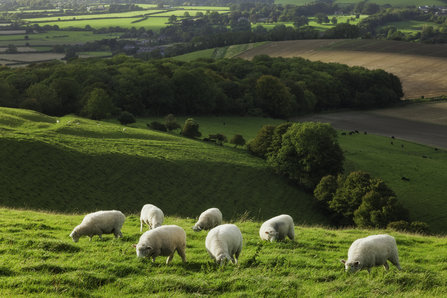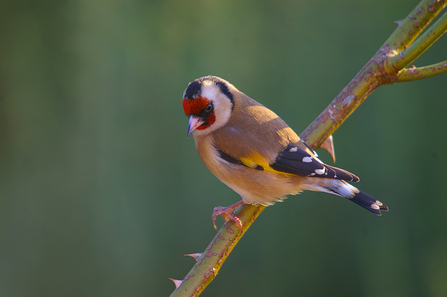Covering 1,565 hectares near the Worcestershire border, Overbury farm is Cotswold arable farm with sheep on Bredon Hill that puts nature at it's heart.
Discover what benefits Jake has seen during his time working at Overbury Farm.
Tell us a little about Overbury farm.
Our land, which includes part of Bredon Hill, sees about 650mm of rain each year and has a real mix of soil types, including Cotswold brash and clay, and we have areas of woodland and lots of hedgerows.
We grow wheat, barley, feed beans, oil seed rape and grass, though we also allow other farming businesses to use some of the land and irrigation for growing spring onions, peas and potatoes.
We also have a 1,100 strong flock of sheep is made of up of North Country Mules and some home-bred North Country Mules crossed with a Texel ram.
How are the farming practices at Overbury Farm different from standard practices?
While we are very keen to maintain many traditional values (such high standards of hedge cutting & keeping on top of wall repairs) we have taken up many aspects of modern technology (such as GPS mapping) to keep us ahead with cost savings & efficiency.
The way we farm causes minimal soil disturbance and keeps living crops on the fields as much as we can. We have a slightly wider rotation – growing a succession of different species to avoid exhausting nutrients and reduce the risk of pests and diseases – which includes ‘cover crops’ to protect the soil.
Where do the sheep come in?
The sheep play an important role in the arable rotation, as mobile fertiliser spreaders, returning organic matter to the thin land during the winter months.
The sheep are brought in to clear patches of land and enrich it with their manure. These animals live healthy lives outdoors throughout the year, and with 45km of footpaths criss-crossing the estate, we’re grateful to dog owners who act responsibly and don’t allow their pets to run freely around livestock, which can lead to injury both to ewes and their lambs.
The ewes have access to a range of different grazing depending on the time of year. Stubble turnips are used to fatten lambs during the winter months and to keep the ewes outside when there is little other feed available.

Sheep (c) Guy Edwardes/2020VISION
How long have you been practicing regenerative agriculture?
Taking care of our soil is important for many reasons, especially around Bredon Hill which historically has been susceptible to erosion. This substance is key to retaining moisture and nutrients.
We’ve been practicing regenerative agriculture since 2013 and are convinced it’s the way ahead in terms of wildlife, the environment and food security, something that’s really come to the fore in recent months. It also makes good business sense, leading to reduced need for expensive inputs, and lowers our carbon footprint.
What are some of the benefits you’ve seen from the changes you’ve implemented?
Regenerative farming had led to us needing to buy in less manufactured fertiliser, while the beneficial insect life encouraged by wildflower margins means we’ve been able to stop using insecticides altogether. We’ve also dramatically cut down on fungicides over the last two seasons.
What are some of the changes to wildlife in and around the farm?
Conservation has always been at the heart of what we do at Overbury Farms, but the value of this work really hit home recently when I went out with a team of bird ringers and witnessed the variety of species found on the 4,000 acres we look after.
We hear and see a lot of skylarks overhead, but it was wonderful to see the goldfinches, yellowhammers and corn buntings up close.

©Neil Aldridge
If you could recommend an easy technique for other farmers to try implement, what would you suggest?
One example of conservation measures are landing strips. These are bare strips in sewn fields to encourage small birds to “pitch in” and nest and margins around fields encouraging bird life and insects.
Is there anything you’d like to add?
We’re proud of the work we’re doing here and were thrilled to be named the Farmers’ Weekly Environmental Champions 2021. Nevertheless, we’re always learning and fine-tuning what we do and are often consulting social media to catch up with the encouraging advances in regenerative farming around the world.
We’ve just signed up for another Higher Entry Level Stewardship scheme and look forward to many more years farming sympathetically with the wildlife we have here.

